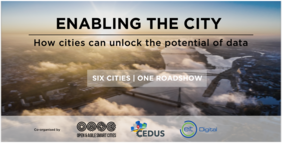Fostering local innovation and increasing efficiency of public services, while decreasing costs and breaking down silos: Many cities use smart technologies to achieve these goals, but are often struggling to extract the promised value out of ICT solutions. Open & Agile Smart Cities and EIT Digital, through CEDUS, launch an event series to demonstrate how common standards support cities in procuring lightweight, interoperable, and open solutions.
Starting in the Finnish capital Helsinki on 28 August, Open & Agile Smart Cities, EIT Digital, Cedus will tour six European Cities - Helsinki, Brussels, Stavanger, Paris, Barcelona, and Milan - to discuss the benefits of OASC minimal interoperability mechanisms for cities to unlock the potential of local digital entrepreneurship. The events will further present an example of an open urban platform built on the OASC principles and powered by FIWARE - the CEDUS City Enabler - and will share insights in the efforts of EIT Digital in supporting cities and communities in their digital transition.
OASC - the Minimalist Approach to Smart Cities
Open & Agile Smart Cities is a non-profit network connecting 117 cities worldwide with the goal to establish so-called Minimal Interoperability Mechanisms (MIMs). MIMs are an evolving baseline set of lightweight and open technical standards to support cities in developing and procuring digital urban services. When implementing MIMs, cities avoid vendor lock-in, while supporting local solutions to scale globally more easily.
Davor Meersman, General Manager, Open & Agile Smart Cities said: "MIMs help smart cities to drive down the cost of innovation by exchanging best practices and solutions. By learning from each other and building on each others successes cities can offer better value to their citizens, developers, and ultimately the larger business ecosystem. The City Enabler is a solution based on OASC principles that could be such an enabler for innovation in the city."
Selected from global developments and best practices, the OASC MIMs are driven by implementation in the member cities of the network. SynchroniCity, Europe's largest smart city IoT project, is currently validating the first set of MIMs in a range of OASC cities in Europe and across the world. OASC works with most important global smart city standards bodies in developing the MIMs in an open ecosystem.
Stéphane Péan, Digital Cities Action Line Leader at EIT Digital: "The digital cities market is booming worldwide, bringing economic and societal benefits to society. With the rise of Internet of Everything (IoE), data will massively expand and support the development of new urban services. To build a digital cities larger market, EIT Digital has launched CEDUS, a strategic innovation activity that already provides an open platform solution to support urban policies but also ease services replication to other cities."
CEDUS City Enabler
An example for local innovation based on the OASC Minimal Interoperability Mechanisms is the City Enabler. This open source platform, developed as part of the CEDUS project and powered by FIWARE, helps cities to turn data into valuable knowledge. Through the City Enabler data can be managed and visualised to support decision making processes and to facilitate the delivery of new digital urban services.
Lanfranco Marasso, Smart City Program Manager at Engineering Ingegneria Informatica SpA:
"The City Enabler supports cities in enabling innovation processes. With the City Enabler cities can give value to existing digital and physical infrastructures and can take advantage of the openness, independence, flexibility and elasticity of the platform. The cities themselves can decide where, how, when, what are the pillars, the relevant domains and the city providers to be engaged within their future vision. The City Enabler can be considered the starting point of the roadmap for the urban digital ecosystem".
The City Enabler is one of the five platforms which have successfully passed phase II of Select4Cities. This pre-commercial procurement project is funded under the European Union's H2020 programme to develop a data-driven, Internet of Everything (IoE) platform to enable large-scale co-creation, testing, and validation of applications and services.
The dates
28 August → Helsinki, Finland (mydata2018 conference)
13 September → Brussels, Belgium (OASC headquarter)
25-27 September → Stavanger, Norway (Nordic Edge Expo)
4 October → Paris, France (EIT Digital)
14 November → Barcelona, Spain (Smart City Expo World Congress)
29 November → Milan, Italy (EIT DIgital)
Registration and overview of all events on the OASC website.

